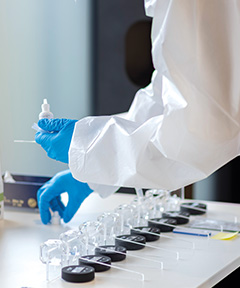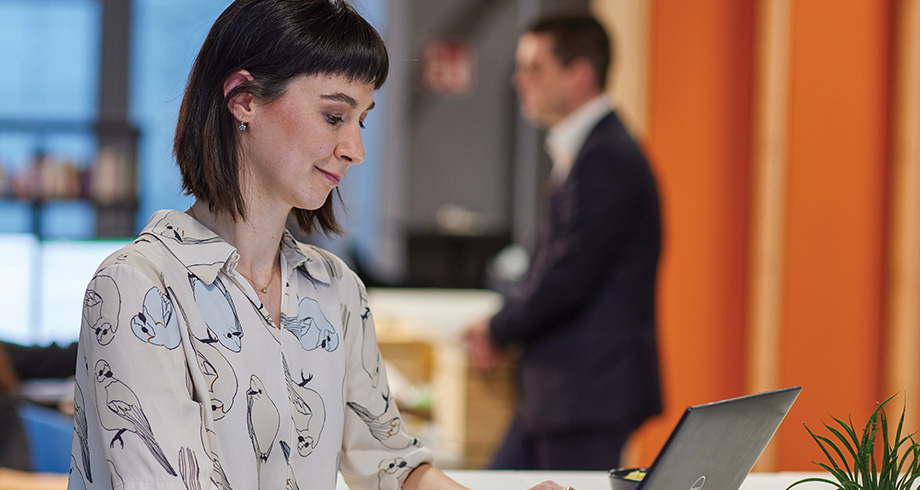2020 – The world has been turned upside-down
2020 was a chaotic year. It was no normal twelve months but instead a year that we will all remember and that will change the world forever. Covid-19 stretched us all to our limits and provoked social and economic upheaval that has changed us permanently and in the long term. The coronavirus pandemic has turned everything on its head: Our way of life, our work, the role of governments and even our economy. What used to be standard practice no longer applies. What comes next is uncertain.
A pandemic gets underway
Covid-19 had killed over 2.5 million people and infected more than 110 million worldwide by the end of 2020 alone, a sad and terrifying statistic. The pandemic showed us how vulnerable our global society is. At the same time, these exceptional circumstances have also demonstrated our innovative strength and resilience. One consistent fundamental idea also dominated the many-voiced, often contradictory analyses of the crisis: Covid-19 was not generally the cause of many developments, but instead reinforced existing trends, as it continues to do. It is plain to see that Covid-19 has increased the pace and momentum of digitalization and sustainability, to name just two areas of transformation.
No role for borders

As paradoxical as this might at first seem given the travel restrictions and border closures, Covid-19 is causing a surge in globalization: For the first time in recent history, all countries and all societies on this planet have been confronted with the exact same challenge. Regardless of how different our countries, cultures, customs or religions may be, Covid-19 has vividly demonstrated the meaning of the abstract term “humanity”. The pandemic does not recognize national or regional borders, affects all countries equally and shows how quickly a virus can spread in a globalized world and how vulnerable and dependent we are. In many places, Covid-19 is fanning the flames of humanitarian crises. Like never before, the global virus has shown us that no country can solve crises of this scale alone. In light of this, we too must play our part and help develop joint solutions, an insight that is also applicable to many other crises in the 21st century.
An economy in crisis
The global health crisis has also prompted societies to reflect on humanity’s relationship with the environment, as well as our actions in the economy and society. It is increasingly clear that the pandemic has its roots, in part, in an unsustainable economic model. Yet the nature of our global economy is also the cause of the drastic climate crisis. So it is with good reason that global efforts to tackle the pandemic are being proposed as a good example for how to address climate change. If we succeed in drawing the right conclusions from the pandemic, Covid-19 could act as a catalyst for climate justice and sustainability on a global scale. Seizing the crisis as an opportunity is therefore the message being spread by many experts. This is an important lesson for businesses as there is evidence that sustainable companies fare better in times of crisis, something that it is important – or better – will become even more important in the future.
Last year once again showed us that we have no time to waste. 2020 was one of the three warmest years since climate records began. The lesson we must learn from this? The pace at which Covid-19 vaccinations were developed must be extended to other areas that will be relevant to the world in the future, such as renewable energy, environmental and species protection and implementing the Paris Agreement and the UN Sustainable Development Goals. Radical change and transformation is required at an unprecedented pace. Force, determination and above all courage will determine whether we succeed in safeguarding the future.
There will be no vaccine for climate change. Change will be required at many different levels and in a wide range of areas. What has to be done is obvious and no longer a secret. We understand the actions and frameworks that are needed to tackle global warming and other environmental pandemics that destroy global habitats. The global economy has an obligation to implement and develop these. If we had needed any real-world proof that this sense of responsibility is felt in the upper echelons of global politics, the fact that rejoining the Paris Agreement was one of US President Joe Biden’s first acts in office would have provided this. The United States rejoining the Paris Agreement reflects the realization that the climate crisis will determine the fate of humanity as a whole.
This decision by what is still the world’s largest economy is the much needed good news that must now be continued and supported by actions. The expectations of revitalized international collaboration to address global challenges that came with the election of a new president in the US have been met. Yet this will not be enough. What we need is a global effort. The fact that China – the country that emits the most greenhouse gases worldwide – has also made moves towards environmental protection makes us optimistic. Although China expands its renewable energy capacities each year more than any other nation, the country as a whole is still too reliant on harmful energy sources. Its announcement that it intends to be carbon neutral “before 2060” is another good signal in the right direction. The European Union has also set ambitious goals: By 2050, Europe wants to be the first carbon neutral continent to remove more CO2 emissions than it produces. In December 2020, EU member states agreed to reduce their net greenhouse gas emissions by at least 55 percent of 1990 levels by 2030. This marked a breakthrough that had seemed impossible until only recently. This was further evidence of our insight: The only way to overcome global challenges is together. No one is safe until everyone is safe. This applies to the climate crisis and to the pandemic alike.

“Only together we can overcome global challenges.”
The crisis as an opportunity
Times of turbulence and upheaval are always interesting, challenging and rewarding periods. For the scientific and economic community, times of change open up great opportunities to do things differently and better, to abandon old approaches and aim for new and improved goals. Taking a crisis as an opportunity must not be merely hot air. The chance to take a crisis as an opportunity must not be missed. It goes without saying that, as a global company, Greiner has also been affected by the shock waves of the pandemic in a number of ways. Thanks to our diversity, the diversification of our products and markets, our love of development and innovative strength, however, we have several company mainstays that provide us with ample support even in tough times. This support allows us to direct all of our efforts towards the vital global transformation towards sustainable business practices.

